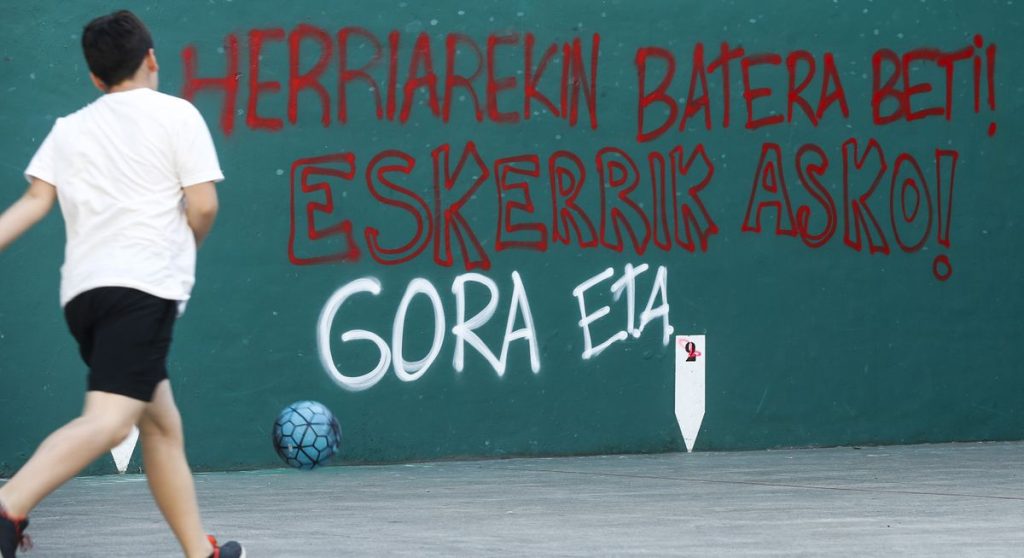When the ETA member Ibai Aginaga entered the fronton in Berango (Bizkaia) around 12:25 on March 13, 2022, just hours after being released from prison, he was greeted by about 250 people as a hero. The terrorist walked through a corridor of honor formed by several attendees as the audience broke into applause, waved flags, and chanted slogans in support of ETA prisoners: with cries like “the struggle is the only way!”, “prisoners to the street, total amnesty!” and “give it your all until victory!”, as explained by the National Court. However, this jubilation, in the opinion of the public prosecutor, was just the prelude to an extensive exercise of “glorification of terrorism” executed afterwards, which included speeches in “homage” to the ETA member; a dance in his honor; a flower ceremony; and a recital of bertsolaris (improvisers of verses in Basque). For all this, the prosecutor is asking for up to two years and nine months in prison for the 17 individuals accused of preparing and participating in the act, according to the indictment accessed by EL PAÍS.
The judge Ismael Moreno, instructor of the National Court, processed 17 individuals on March 19 for the celebration of that reception in Berango for a prisoner of the terrorist group—a popularly known act as ongi etorri that victims’ associations consider a humiliation. Among the accused are, in addition to Aginaga himself, another half a dozen ETA convicts such as Ziortza Fernández, Aitor Artetxe, and Endika Lejarceji, among others. The Prosecutor’s Office, which filed its indictment two days after the judge proposed to bring them to trial, maintains that all of them “exalted ETA terrorism and its members in a public and organized manner, with the aim of keeping alive the idea that the violent methods of that terrorist organization are still valid for achieving its goals (a socialist, independent, Basque-speaking and reunified Euskal Herria) and that, in the future, these violent methods will have to be resumed as there is no other way to achieve such objectives”.
The tribute to Ibai Aginaga was not a spontaneous act, as victims’ associations such as Dignity and Justice denounced. According to the public prosecutor, it began to be prepared several days before the ETA member was released from prison, allegedly driven by the “anti-repressive movements” called Jardun, Tinko, and Gasteizko Elkartasun Komitea (GEK). These three groups are part of the most radical sector of the Basque left-wing nationalist movement and have distanced themselves from the violence cessation policy established by Sortu. In fact, two days before the terrorist’s release, Tinko issued a statement praising Aginaga as an “example of dignity” in times of “repentance, surrender, and collaboration”.
One of the accused, Hegoi Uriarte, reserved the fronton of Berango on behalf of the Association Kultural Kandaru Euskal Kultura Sustatzeko, allegedly to hold a “bertso” (verse) session and a meal on March 13, according to the Prosecutor’s Office. However, in reality, as emphasized by the public prosecutor, the goal was to celebrate an ongi etorri from the outset. After being released, Aginaga was driven by car to Berango. “During the journey, banners had been placed on the bridges spanning the A-8 motorway. On the bridge located at the height of the neighborhood of Burceña in Barakaldo, four people were positioned who lit flares and set off fireworks as the group of vehicles passed by,” recalls the indictment, which then details what happened inside the fronton of the Basque municipality.
The struggle against the ongi etorri events has been ongoing for years, with victims’ associations calling for them to be stopped, considering them a humiliation. After years of complaints, in late 2021, the ETA prisoner collective (self-named EPPK in Basque) issued a statement acknowledging that these acts caused “pain” and requested that, in the future, these tributes be held only in private spaces and limit participation to “relatives”. However, some dissident factions continued to promote them in 2022 as demonstrated by Aginaga’s reception in Berango. But in 2023, according to the Victims of Terrorism Collective (Covite), they had disappeared: “It has been the first year in which no such act has been registered since Covite began publicly denouncing them in late 2016”. Despite this change, several legal cases remain pending in the courts, as efforts continue to prosecute those involved in these events to hold them accountable for their glorification of terrorism.


